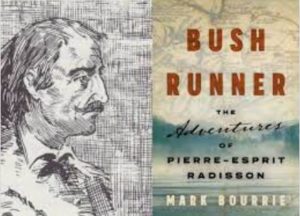Answering a screed on Canadian nonfiction
Ken Whyte is trolling, I know, but I can’t help responding to that scattershot screed he published by David Lemon. Some of what Lemon writes about Canadian nonfiction, let me be clear, I agree with. But much of it, speaking as a writer of historical and biographical narrative, much of it I reject. Lemon asserts that . . ..
- Canada’s history presents no vivid protagonists and antagonists. I would point to stories out of the fur trade and northern exploration. Consider Pierre Radisson and his naysayers as depicted in Marc Bourrie’s Bushrunner. And what of John Rae and Lady Franklin, as portrayed in my own Fatal Passage and Lady Franklin’s Revenge? There are lots more larger-than-life figures where they came from.

Bushrunner
- No great bloodletting, no violent collision of ideologies? What about fur-traders versus settlers, Nor’westers versus Red River Colonists, and the Battle (once called a Massacre) at Seven Oaks — or alternatively the Victory at Frog Plain. What of the Riel Rebellion? Or separatism versus federalism, as represented by Rene Levesque and Pierre Elliott Trudeau?
- No periods of artistic foment? I think of the late 1960s and early 1970s, when writers like Margaret Atwood, Graeme Gibson, and Dave Godfrey helped foster an explosion of Canadian-owned publishing houses across the country – most of them, sadly, now diminished or disappeared. Which is why I feel that we nonfiction writers, having got caught up in a game of Snakes and Ladders, recently hit a whopper of a snake and find ourselves awakening into a high-tech 1950s.
- Historical stories too well rehearsed? No, the opposite is true. Historical stories require constant revision in response to the shifting of the present-day context. The American Civil War is decidedly well-rehearsed yet continues to demand revision – and commands audiences. In Canadian history, for anything comparable, I would look not to the Seven Years War but to the disappearance in the Arctic of the 1845 Franklin expedition and the decades-long search that followed. That is a saga with an international dimension.
- Canada’s builders “are said to be profoundly contaminated by colonialism and racism.” As a result, Lemon adds, Canadian gatekeepers are setting aside this dimension of our history. He makes a good point. But this is where those gatekeepers go wrong. Now, more than ever, we need to revisit this history and these stories. Instead, we seem bent on throwing out the baby with the bath water. In this metaphor, the baby is Canada and the bathwater includes the residential school system.
- Put it this way: you can attack the building of the Canadian Pacific Railway as a colonial project, but without it, today there would be no Canada. Either we would not exist – our ancestors having been massacred in a northern Wounded Knee – or we would all be Americans dealing with the Big Lie and the Republican assault on a woman’s right to control her own body.
- I for one reject the prevailing attempt to eradicate those parts of our history “filtered through the British influence in Canada.” As I argued in Celtic Lightning, writers of history should reject the limitations of Canadian geography — which indeed ends in the east at the Atlantic ocean — and instead take our cues from genealogy, which crosses that ocean in a bound. Immigrants and refugees bring values and ideas that shape countries, and it is foolish and dangerous to pretend otherwise.
Well said, Ken. I’d add that Lemon has a very trad, macho view of history — ie, military and political. With the right approach, other aspects of the past ( social, literary, economic) can also grab readers. High drama does not have to be confined to men killing each other. The dramas of family feuds, the impact of new inventions, the experiences of newcomers, the intriguing contrasts between different social systems — a writer can grab a reader’s attention with any of these.
Thanks, Charlotte. Agree 100%. So much more to say. Maybe we need another webinar? (Just kidding!)
The the proposition that writers’ subject matter is limited by the history of their native country is groundless to begin with. Think of Northrop Frye’s Anatomy of Criticism, Margaret MacMillan’s Paris 1919, Stephen Bown’s Merchant Kings and countless other excellent non-fiction works by Canadian writers on all sorts of things that have nothing to do with Canada. More to the point, the idea that good non-fiction can only be written about events that rise to some global standard of recognition is vestigial colonialism. Kick that prejudice and you realize there is endless material for excellent writing, fiction and non-fiction, in the everyday life of the smallest community. Look at tiny Iceland, with the world’s most thriving literary culture based on the trials and tribulations of a population of 400,000. In Canada we have Quebec writing circles around the rest of the country with only 22% of the population but a much stronger belief in the value of its own unique experience. That’s what is being lost in Canada today.
True dat, Howard. I think of books by Ross King, Malcolm Gladwell, Naomi Klein, Ronald Wright. Two of my own works take place mostly elsewhere — Race to the Polar Sea in the U.S. and Greenland, Lady Franklin’s Revenge in England and Tasmania.
Stephen Kimber, Dean Jobb, Marq de Villiers, Irshad Manji, Steven Heighton, Merilyn Simonds. I’d better stop now.
Wow. What a very succinct and articulate rebuttal. I could not agree more.